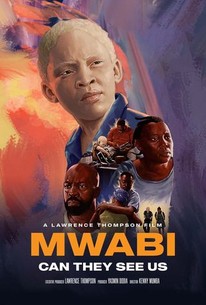Good films are coming from all corners of the earth. Zambia has done films and developed some expertise, but "Can you See Us? is the first to make the American Netflix. There is usually a lot of accessible information to sift through, but Zambia has a short history. Roughly over 90% of the dialogue is in English with some in Nyanja (subtitled).
One factor giving this film credibility is the back story. John Chiti was born an albino, meaning with no skin pigmentation he was white. His father was so upset, he blamed his wife and divorced her. Another man stepped in was treated as a father. At first he was sheltered, but when he ventured out he was mocked and bullied. His stepfather explained that people feared those who were different.
After his mother died he was able to live with his father and step-mother. His father had changed his attitude and John not only got a stepmother (in the film she was initially upset), but also some siblings. He discovered music and became accepted as a composer and performer.
The film also depicts an attack he endured at the age of 15. There existed a superstition that the body parts of an albino had magical powers. He was rescued, but such attacks are too common in Africa.
Not shown in the film are that he became an advocate starting the Albinism Foundation of Zambia. He also got involved with the African Disability Protocols to help promote disability rights across the continent. He wrote a song, Corona Virus to point out the challenge of dealing with the pandemic for the disabled. He feels his celebrity on television and from his songs has made life easier for albinos. He helped contribute to the script.
"Mwabi," the original title is a derogatory term for albinos.
Cast and crew deserve some attention for this historic effort that is well worth your time.
Kenny Mumba was the director. This is his first credit as director, but has one credit each for editing and cinematography. He had gained experience with commercials across several African countries.
Lawrence Thompson did the writing Lawrence was an executive producer and the main writer. He also directed a short film. He created Zambia's first soap opera, producing and directing over 100 episodes. He was a cameraman during the research for "Cry Freedom" (1987). Andrew Thompson also was involved with the script had been an accountant for a previous film
Yasmin Dodia-Mumba was the producer. She has a background in commercials and musical videos.
Rick Joaquim was the cinematographer 36 credits as cinematographer. Started in South Africa doing music videos and commercials. Later based in London getting involved with narrative films returning to South Africa. Won numerous awards internationally.
Leon Gerber works from South Africa with 11 film credits as editor. Nathan Busumani was also editor with his first film and had a small role in the film.
Kangwa Chileshe played the father. He has three film credits, all in Zambia.
Cast a young albino girl Thabo Kaamba to play the role of Joseph at the age of eight, Thabo’s path crossed with Yoweli, a local filmmaker who cast her in "Ubunto season 2", a show that aired in South Africa.
The President of Zambia, Hakinde Hichlema attended the premiere and has promised he would take steps to improve the situation.
African films have not gotten much attention in North America, but that is changing. Recently the Group of 20 invited the African Congress to join. Nigeria is already a prolific film producing nation, developing skills and making inroads to the rest of the world. Check: http://www.therealjohndavidson.com/2020/07/nollywood-upcoming-force-in-global-films.html

No comments:
Post a Comment